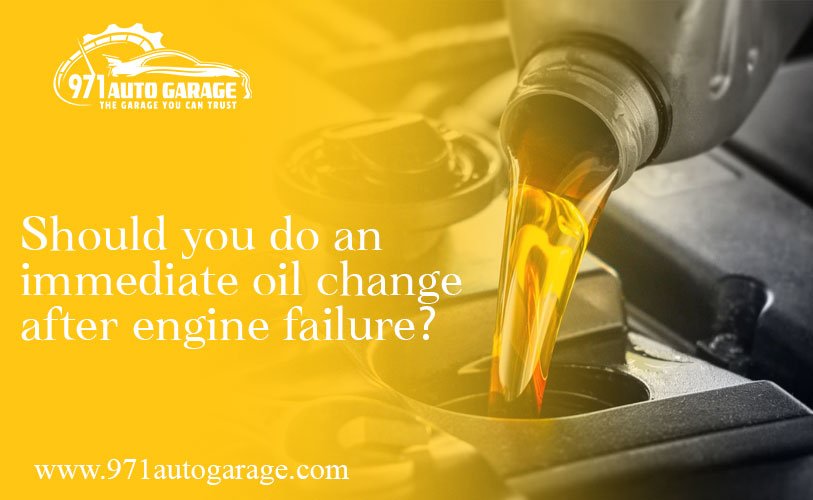When your car suffers an engine failure, one of the first questions that comes to mind is whether you should replace the engine oil immediately. The answer depends on what caused the failure and how severe it was. Engine oil plays a crucial role in lubricating internal components, preventing friction, and managing heat. When something goes wrong, the oil often bears the brunt of the damage.
In this guide, we’ll explore how engine failures affect oil, what signs indicate you need an oil change, and when it’s safe to replace or flush it after repairs. We’ll also look at the importance of choosing the right oil service in Dubai to protect your vehicle in the long run.
1. Understanding the Role of Engine Oil
The engine oil is the lifeblood of your vehicle. It ensures smooth movement of components, prevents overheating, and reduces wear and tear. Without it, metal parts grind together, causing severe damage in seconds.
However, when an engine fails — due to overheating, oil contamination, or part malfunction — the oil inside often becomes degraded or full of metal debris. Reusing this oil after repairs can cause further engine damage, even if the issue seems resolved.
That’s why visiting a professional Engine oil change garage in Dubai after an engine failure is critical. Expert technicians can assess whether your oil needs replacement, flushing, or a complete lubrication system cleaning before refilling with fresh oil.
2. What Happens to Engine Oil During Engine Failure
When the engine fails, several things can happen to the oil inside:
- Contamination: Metal shavings, carbon deposits, or coolant leaks can mix with the oil.
- Viscosity Change: Heat or combustion residue can make oil thicker or thinner.
- Loss of Lubrication Quality: Prolonged stress or breakdown reduces the oil’s ability to protect moving parts.
If these issues aren’t resolved before restarting your engine, they can quickly lead to secondary failures. This is why experts often recommend draining and inspecting the oil immediately after mechanical failure.
Drivers can also refer to The Importance of Regular Oil Change Dubai Services for Your Vehicle to understand how routine maintenance prevents major breakdowns in the first place.
3. Signs You Should Replace Engine Oil After Engine Damage
After an engine-related issue, check for these common indicators that an oil change is needed:
- Discolored Oil: Black, gritty, or milky oil signals contamination.
- Burnt Smell: Indicates overheating or burnt residue in the oil.
- Low Oil Level: A leak or consumption issue after a breakdown.
- Engine Noise: Knocking or tapping sounds mean poor lubrication.
- Metallic Particles: Visible flakes in oil mean internal wear.
Neglecting these warning signs can lead to more costly repairs later. It’s always safer to perform an oil change before restarting your vehicle after a major breakdown or rebuild.
For premium repairs, visiting a best car engine replacement Dubai services provider ensures that both your new engine and oil system are installed to manufacturer standards — protecting your investment and restoring smooth performance.
4. When Should You Perform the Oil Change After an Engine Failure?
Timing matters when it comes to post-failure maintenance. Here’s what experts suggest:
- After Engine Repair or Rebuild: Always change the oil immediately after replacing or repairing an engine. This flushes out contaminants from the old system.
- Before Testing or Running the Engine: New oil helps lubricate fresh parts during the first ignition.
- After 500–1,000 km of Use: A second oil change after break-in ensures no residual particles remain.
If your engine has been severely damaged, flushing the entire lubrication system before refilling is often necessary. Neglecting this step could reintroduce contaminants, shortening your engine’s lifespan.
For premium care, many vehicle owners trust specialized workshops like Rover Service Center in UAE, known for handling complex oil and engine-related issues with precision and quality components.
5. Choosing the Right Type of Engine Oil
Selecting the correct oil after a failure is as crucial as the repair itself. Use manufacturer-recommended grades such as 5W-30 or 10W-40, depending on your vehicle model and climate. Fully synthetic oils offer better protection and performance for Dubai’s high temperatures.
Here’s what to consider when choosing oil:
- Viscosity: Determines how the oil flows at different temperatures.
- Additives: Enhance performance by cleaning and protecting parts.
- Compatibility: Always match oil type with your car’s specifications.
Using cheap or incorrect oil after an engine rebuild can undo all your repair efforts. Always use high-quality brands and ensure the oil filter is replaced alongside the oil.
In the context of broader auto care, reading Comprehensive Car care for All Brands in Dubai can provide valuable insights into maintaining optimal performance across all vehicle systems.
6. The Cost of Oil Change After Engine Failure
The price of a post-failure oil change varies based on:
- Oil Type: Synthetic oils cost more but last longer.
- Engine Size: Larger engines require more oil.
- Garage Services: Premium service centers offer quality assurance and proper disposal of used oil.
In Dubai, the average cost of an oil change ranges from AED 150 to AED 450. If paired with engine flushing or replacement, total costs may rise depending on labor and parts.
However, this small investment is worth the protection it provides against future mechanical issues. Quality oil ensures your new or repaired engine performs efficiently and lasts longer.
7. Preventing Future Engine Failures with Regular Maintenance
While you can’t predict every engine failure, you can reduce the risk through preventive care. Here’s how:
- Follow the manufacturer’s oil change intervals.
- Use high-quality filters and lubricants.
- Monitor oil levels regularly.
- Address small leaks immediately.
- Avoid overheating by checking coolant and thermostat systems.
If your car recently underwent an engine replacement, pairing maintenance with periodic checkups ensures a trouble-free driving experience. Combining timely oil changes and mechanical inspections guarantees that your vehicle remains in peak condition, even under Dubai’s challenging climate.
8. Should You DIY or Visit a Professional Garage?
While basic oil changes can be done at home, post-engine-failure maintenance is best handled by experts. Professional technicians have the tools to diagnose oil contamination, flush the system properly, and refill it with the right grade.
DIY oil changes often miss hidden issues, like sludge buildup or oil pump damage, which can cause recurring problems. That’s why visiting certified service centers is always recommended.
Professionals also handle proper waste oil disposal — a key environmental responsibility often overlooked by DIY enthusiasts.
9. Final Thoughts
After an engine failure, never underestimate the importance of changing your engine oil promptly. Contaminated or degraded oil can cause severe internal damage, undoing the benefits of your repair or replacement. Whether your engine suffered from overheating, mechanical wear, or oil starvation, replacing the oil is a non-negotiable step toward restoration.
By working with trusted service providers, using high-quality oil, and maintaining regular oil intervals, you can protect your engine and ensure long-term performance. Prevention, after all, is the most affordable repair.
5 Frequently Asked Questions (FAQs)
1. Should I change my oil after my engine fails?
Yes, engine failure often contaminates oil with debris, coolant, or metal particles. Changing it immediately prevents further damage.
2. How soon after engine repair should I change the oil?
Change it right after the repair or replacement and again after 500–1,000 km to remove any residual debris.
3. What type of oil is best for rebuilt engines?
Fully synthetic oils with the recommended viscosity grade are best for high-performance protection in Dubai’s heat.
4. Can I use old oil after an engine rebuild?
No, old oil is contaminated and will damage new engine components.
5. How often should I change my engine oil in Dubai?
Typically every 5,000–8,000 km, but always follow your car manufacturer’s maintenance schedule.


